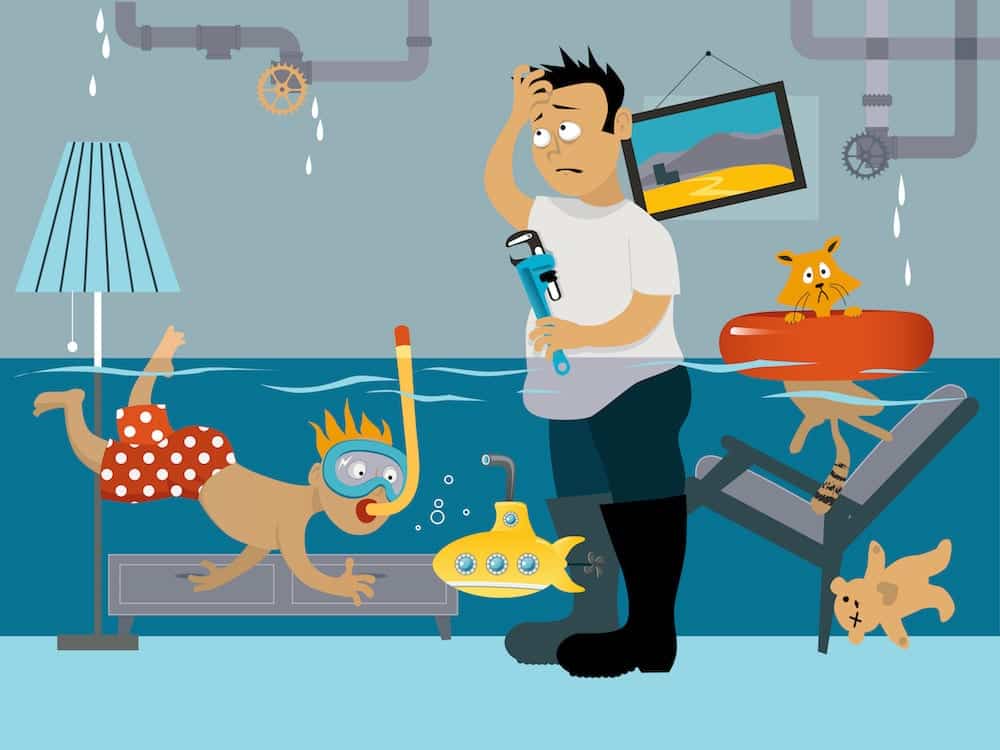It’s hard to imagine life before indoor plumbing, when water for cooking and bathing was hauled into the house by the bucketful, people took sponge baths in little tin tubs, and chamber pots and outhouses were the norm. We’ve grown so accustomed to modern plumbing innovations that we often don’t give much thought to our hot showers, efficient dishwashers and washing machines, and flush toilets—until something goes wrong. Here are common plumbing issues and helpful tips:
- CLOGGED DRAINS
Whether you’re doing the dishes, brushing your teeth, or taking a shower, it’s annoying (and—let’s be honest—kind of gross) when water doesn’t go down the drain.Tip: Don’t rely on opening drains with chemicals—they can ruin drain pipes and equipment. Instead, prevent clogs in the first place by installing screens to catch particles before they go down.
- NO HOT WATER
Nothing will get you out of a shower faster than when you run out of hot water midway through.Tip: If you have a gas water heater with a pilot light, make sure the light is lit. If you don’t know exactly what you’re doing, though, call a professional. (You don’t want to mess around with gas.)
- CLOGGED TOILETS
The dreaded clog. When your plunger can’t dislodge a clog, try a toilet auger (just be careful not to scratch the toilet bowl).Tip: Even when products are labeled “flushable” (kitty litter, makeup remover wipes, etc.), do not flush them. Only flush TP and, you know, the obvious.
- LEAKING FAUCETS
Drip. Drip. Drip. Drop. Many times, a dripping faucet can be fixed by replacing the washer.Tip: Easy, Hulk. You can extend the life of your faucet by not being so forceful when turning the faucet off.
- LEAKING WASHING MACHINES OR DISHWASHERS
If there’s a crack in a water hose behind the washer, do not ignore it. Mold and rust could become serious issues.Tip: Change out rubber hoses on washing machines and dishwashers every five years, and use stainless steel on water lines, if possible.
- LEAKING PIPES
When water gets behind the walls or into the insulation, damage can be extensive, leading to mold and structural deterioration.Tip: Watch for spikes in you water bill—this might give you a clue that a pipe is leaking. Leaking pipes can be a precursor to bursting pipes.
- FROZEN PIPES
During our frigid Minnesota winters, it’s not unusual for water pipes to burst, leading to flooding, structural damage, even mold.Tip: In order to avoid emergency situations with frozen pipes, take these preventive measures: insulate your water pipes with foam from your local hardware store, and install heat tape on exposed plumbing to add an extra layer of protection from the cold.
- LEAKING WATER HEATERS
When water is leaking from a water heater, you’re not only wasting money, but risking property damage. A valve can easily be replaced, but a rusted-out tank lining will likely warrant an entirely new water heater.Tip: The leak won’t magically go away on its own. Fixing the problem is a high priority. Call Bonfe.
- RUNNING TOILETS
That sound of water running? That’s the sound of your water bill going up, up, up. You might need to replace broken internal components, from a warped flapper valve to a too-short chain to the position of the float for the pump.Tip: Before you investigate what might be wrong, turn off the water connecting to the toilet (the silver knob on the wall). Turn it all the way to the right.
- MALFUNCTIONING GARBAGE DISPOSALS
A jammed disposal can be messy, stinky, and dangerous. Fight your first instinct to reach your hand down into the drain to clear the obstruction: there’s a grinding chamber. Those impellers can easily grind fingers. Tip: Run cold water while using your garbage disposal, and don’t ever dump grease, it eventually solidifies. If your garbage disposal is starting to smell, try quartering a lemon and grinding it up. (It really works.)
If you don’t know what you’re doing, certain DIY jobs can be dangerous to your family’s health and safety (and can cost more in the long run). For the safety and integrity of your home, it’s best to call a professional Bonfe plumber who has the training to fix issues quickly and repair problems correctly.


I agree with all these lists. It’s important to fix all of them before they turn into large problems. You should watch out for signs of leak like sounds of drips, the joints of the pipes looks rusty and smell of mold in the basement.